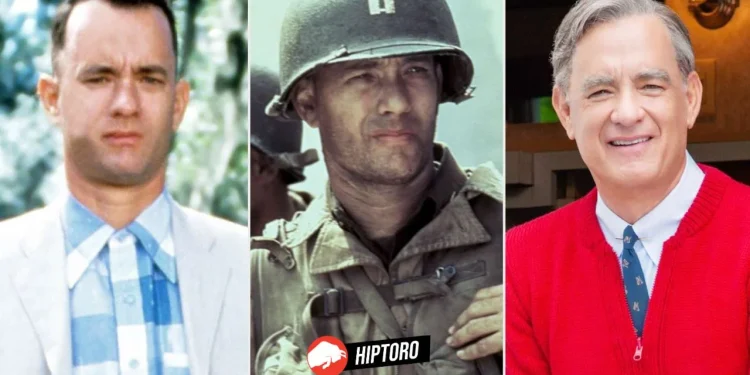Tom Hanks is not just a name; it’s a legacy that spans decades within the cinematic universe. With an acting career that covers a vast array of genres, from heart-wrenching dramas to lighthearted comedies, Hanks has proven time and again why he is considered one of Hollywood’s most versatile and enduring actors. His films are more than just entertainment; they are a reflection of life’s complexities, joys, and the human condition. This article aims to delve into the top 10 movies of Tom Hanks, offering an in-depth analysis of each film’s plot, character arcs, thematic essence, and the cultural impact these works have fostered. Through this exploration, we will trace the evolution of Hanks as an actor and the indelible mark his career has left on the cinematic world.
Evolution of Tom Hanks: From Comedic Roles to Dramatic Stalwart Before diving into the individual analyses of his top 10 movies, it’s crucial to understand Tom Hanks’ evolution as an actor. Starting his career with a penchant for comedic roles, Hanks quickly showcased his range, transitioning into more serious and complex characters that have since defined his legacy. This journey reflects not just personal growth but an adaptation to the changing landscapes of Hollywood and its narratives. From his early roles in the 1980s to his award-winning performances in subsequent decades, Hanks’ ability to imbue his characters with authenticity, empathy, and depth has made him a beloved figure in cinema. This section will explore how the selected movies reflect Hanks’ growth and versatility as an actor, touching upon the diverse roles he has undertaken and the challenges he has embraced along the way.
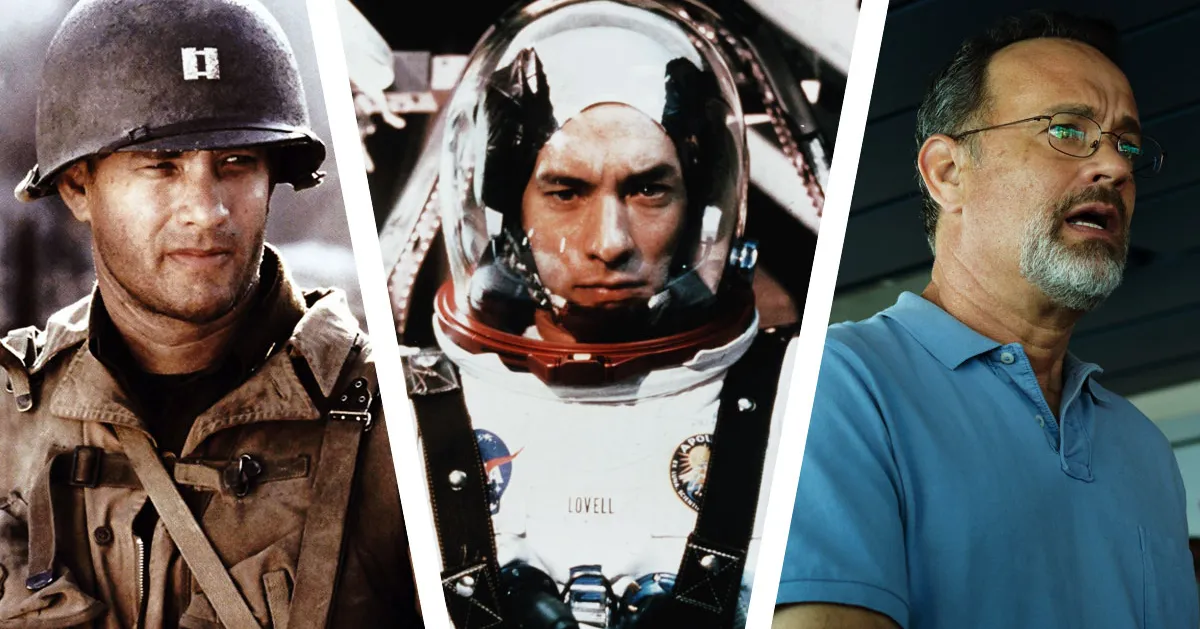
Given the depth and breadth of content required to do justice to each of Tom Hanks’ top 10 movies, including plot summaries, character development analysis, thematic exploration, actors’ performances, cultural impact, critical reception, and comparisons to other notable works in his career, this article will be structured to gradually build a comprehensive narrative around Hanks’ cinematic journey. We will incorporate quotes from film critics, snippets from interviews with Hanks and his co-stars, and relevant trivia to enrich the discussion.
Let’s begin with the first movie on our list, focusing on its plot, character arcs, thematic elements, and the cultural and critical reception it received. As we go through each film, we’ll weave in the narrative of Hanks’ evolution in Hollywood, culminating in a section that reflects on his legacy and influence on contemporary cinema.
Given the expansive scope of Tom Hanks’ filmography, selecting the top 10 films to encapsulate his career is no small feat. However, for the sake of this analysis, we’ll focus on a mixture of critically acclaimed hits, audience favorites, and those that have significantly impacted Hanks’ career trajectory and Hollywood at large. Let’s start with what many consider a turning point in his career, the film that solidified his place as a serious actor in Hollywood: “Philadelphia.”
1. Philadelphia (1993)
Plot Overview: “Philadelphia” is a groundbreaking drama directed by Jonathan Demme, where Tom Hanks portrays Andrew Beckett, a competent lawyer who is secretly battling AIDS and is unjustly fired from his law firm because of his condition. The film follows Beckett’s journey as he fights for justice and dignity, with the help of a homophobic lawyer, Joe Miller, played by Denzel Washington.
Character Development & Performance: In “Philadelphia,” Hanks delivers a transformative and heart-wrenching performance that not only earned him an Academy Award for Best Actor but also showcased his ability to tackle complex, dramatic roles. Hanks’ portrayal of Beckett’s physical and emotional turmoil brought attention to the AIDS crisis and humanized the struggle of those affected by the disease, marking a significant departure from his previous comedic roles.
Thematic Elements: The film tackles themes of discrimination, prejudice, and the fight for justice, making a profound statement on the AIDS epidemic and gay rights issues of the early ’90s. “Philadelphia” was among the first mainstream Hollywood films to acknowledge HIV/AIDS, homosexuality, and homophobia, opening up conversations in households and communities around the world.
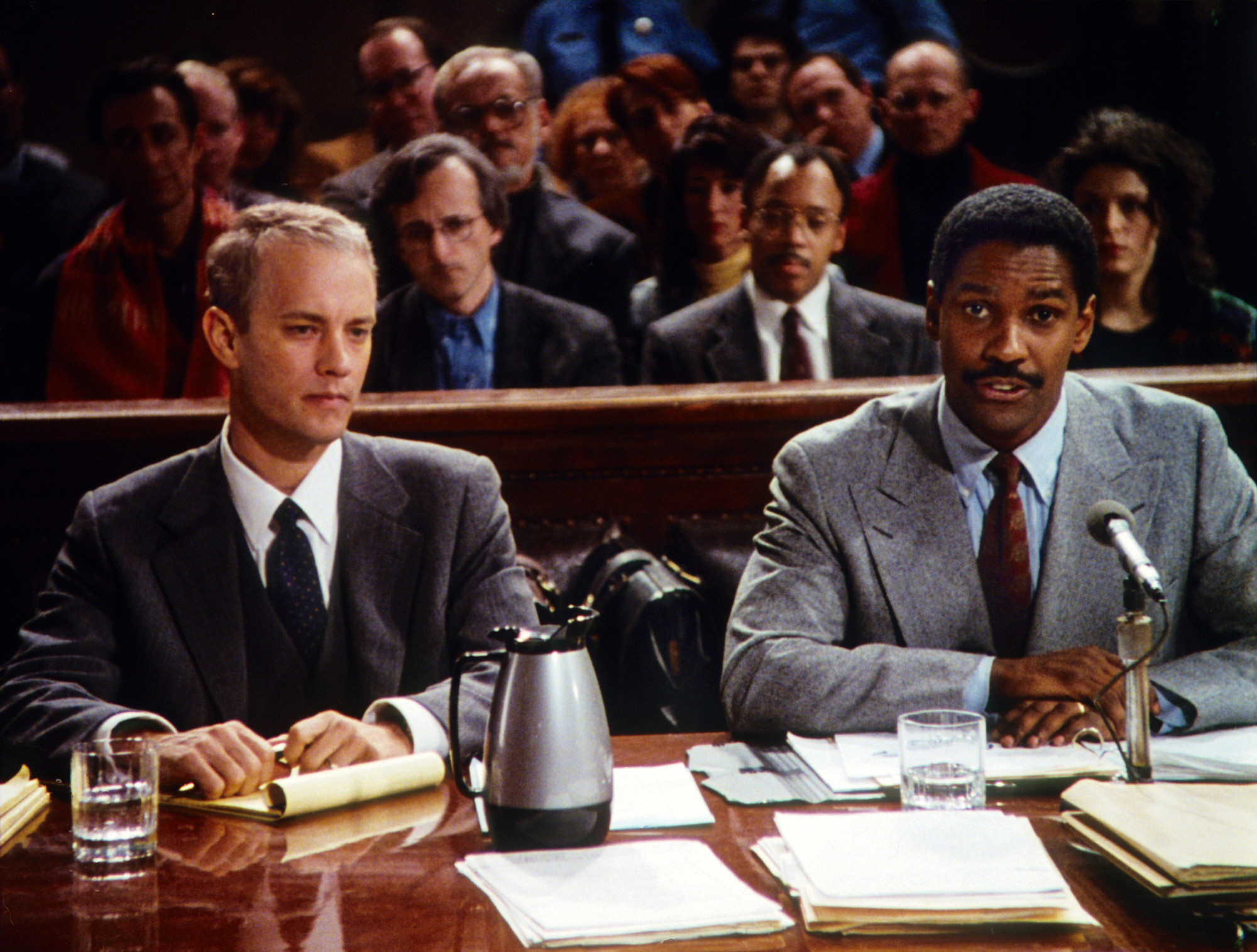
Cultural Impact & Critical Reception: “Philadelphia” was met with critical acclaim and is credited with bringing the conversation about AIDS to a mainstream audience. The film’s cultural significance lies in its ability to challenge perceptions and foster empathy, making it a landmark film in the representation of LGBTQ+ individuals in cinema.
Comparisons & Legacy: Comparing “Philadelphia” to other works in Hanks’ career, it’s clear that this film was a watershed moment, demonstrating his range and commitment to challenging roles. The movie set the stage for future performances in films like “Forrest Gump” and “Saving Private Ryan,” where Hanks continued to explore complex characters and themes.

Moving forward in our exploration of Tom Hanks’ top 10 movies, we next delve into a film that not only won hearts but also showcased Hanks’ unparalleled ability to captivate audiences with a tale of innocence, hope, and the simplicity of life: “Forrest Gump.”
2. Forrest Gump (1994)
Plot Overview: Directed by Robert Zemeckis, “Forrest Gump” is a magical realism drama that follows the life of Forrest Gump, played by Tom Hanks, a man with a low IQ but a pure heart, who finds himself inadvertently influencing several historical events in 20th-century America.
Character Development & Performance: Hanks’ portrayal of Gump is nothing short of iconic, earning him his second consecutive Academy Award for Best Actor. Through Gump’s eyes, the audience experiences a whirlwind of emotions, from joy to sorrow, without ever losing the character’s inherent innocence and optimism.
Thematic Elements: “Forrest Gump” explores themes of destiny, innocence, and the impact of history on personal lives. It’s a film that questions the idea of greatness, suggesting that it’s one’s moral compass and kindness that truly define a person’s legacy.
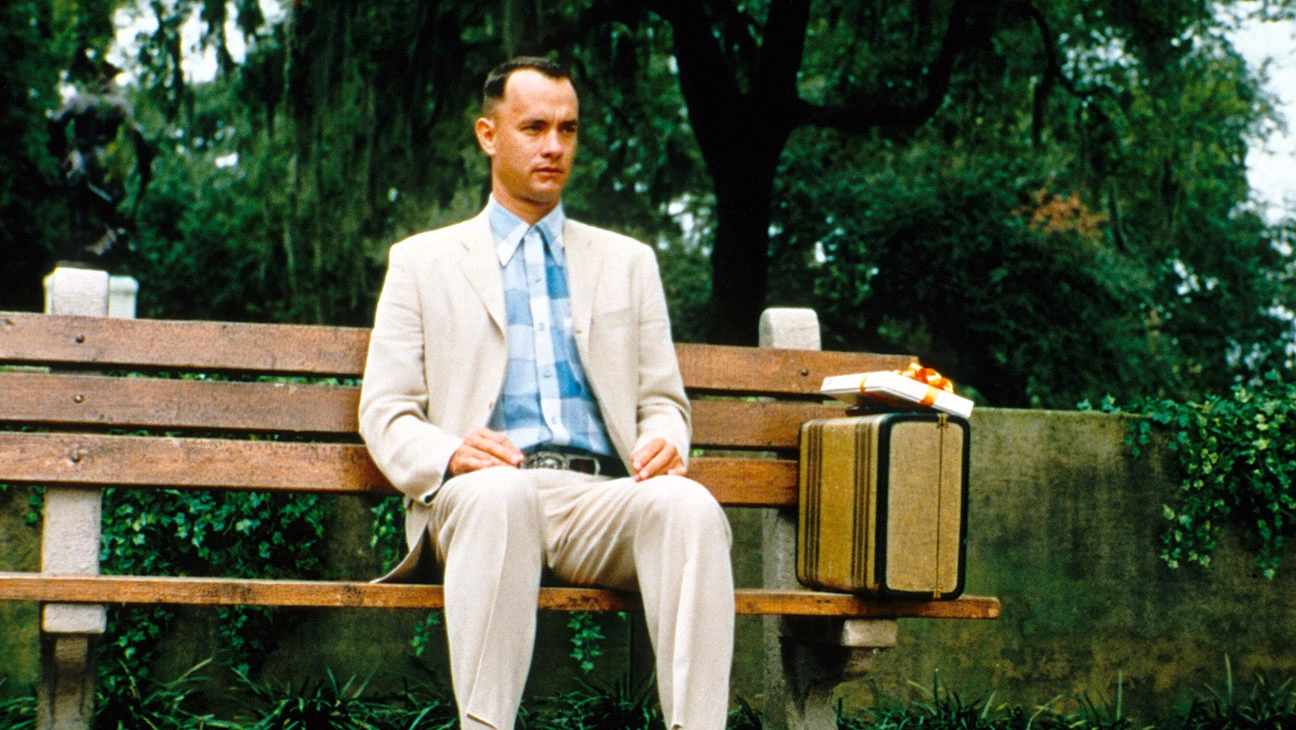
Cultural Impact & Critical Reception: The film was a massive box office success and has since become a cultural touchstone. Its quotes and scenes have infiltrated popular culture, and its message of love and hope continues to resonate with audiences around the world.
Comparisons & Legacy: “Forrest Gump” stands as a testament to Hanks’ ability to embody characters who, despite their simplicity, convey profound truths about humanity. The film’s success further cemented Hanks’ status as one of Hollywood’s most beloved actors and set a high benchmark for his future roles.

These analyses of “Philadelphia” and “Forrest Gump” serve as the starting point for our deep dive into the top 10 movies of Tom Hanks. Each film showcases a different facet of Hanks’ extraordinary range and his ability to leave a lasting impact on the film industry and its audiences.
Continuing our journey through the illustrious career of Tom Hanks, we next explore a film that not only exemplifies his versatility as an actor but also his ability to anchor a story that is as much about the human spirit as it is about survival and resilience: “Cast Away.”
3. Cast Away (2000)
Plot Overview: Directed by Robert Zemeckis, “Cast Away” tells the story of Chuck Noland, a FedEx executive who survives a plane crash and finds himself stranded on a deserted island. The film chronicles his struggle to survive and his journey of self-discovery, isolation, and the will to return to his loved ones.
Character Development & Performance: In “Cast Away,” Hanks delivers a powerful, largely solo performance that showcases his ability to convey a wide range of emotions without the support of a traditional ensemble cast. His portrayal of Noland’s physical and emotional transformation is compelling, earning him critical acclaim and an Academy Award nomination for Best Actor.
Thematic Elements: The film explores themes of isolation, survival, and the human condition, questioning the nature of time, love, and the essence of life itself. “Cast Away” delves deep into the idea of what it means to be truly alone and the intrinsic human need for connection and purpose.
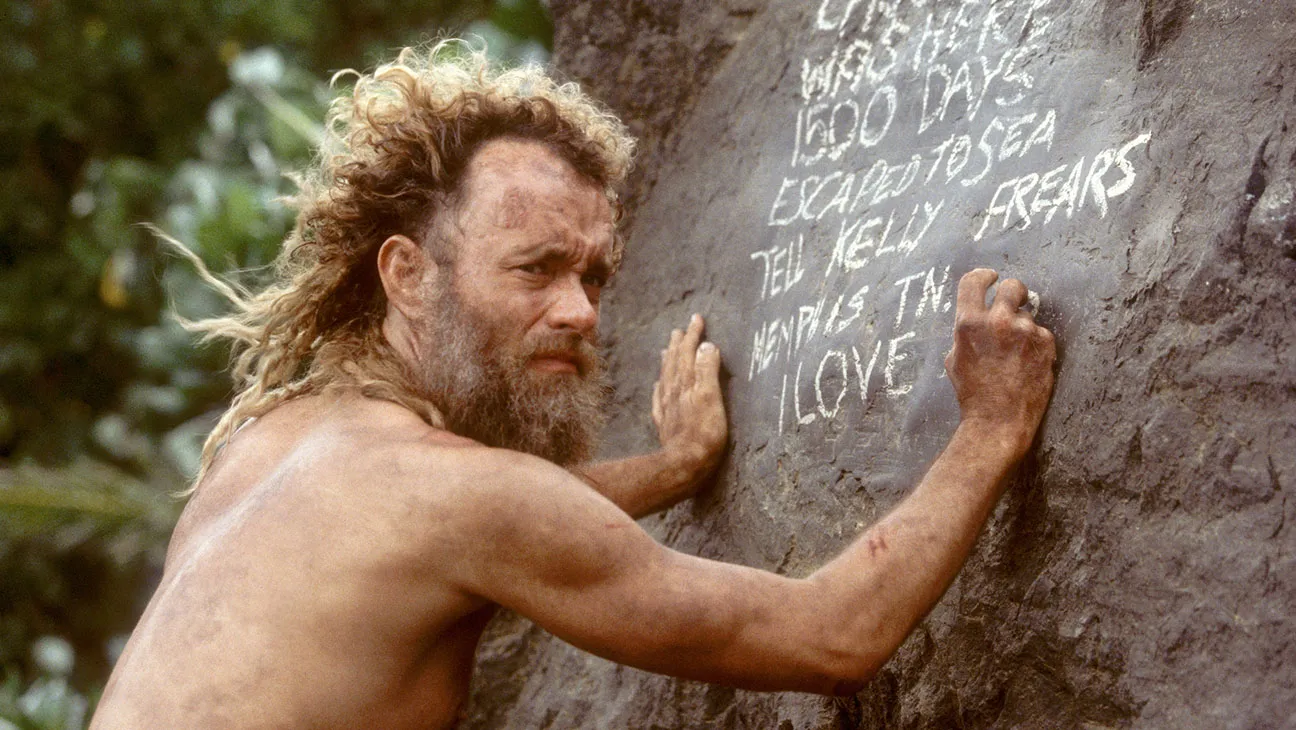
Cultural Impact & Critical Reception: “Cast Away” was both a critical and commercial success, resonating with audiences for its poignant exploration of solitude and resilience. Hanks’ performance was lauded for its depth and authenticity, further solidifying his reputation as one of the most talented actors of his generation.
Comparisons & Legacy: “Cast Away” stands as a unique entry in Hanks’ filmography, demonstrating his skill in carrying a film almost entirely on his shoulders. The movie’s impact on popular culture, including the iconic portrayal of Wilson the volleyball, highlights Hanks’ ability to create memorable, emotionally resonant characters.

As we transition from the isolated shores of “Cast Away,” we find ourselves amid World War II with Hanks leading a group of soldiers in the critically acclaimed “Saving Private Ryan.
4. Saving Private Ryan (1998)
Plot Overview: Directed by Steven Spielberg, “Saving Private Ryan” is a war film set during the Invasion of Normandy in World War II. Tom Hanks plays Captain John H. Miller, who leads a group of soldiers on a mission to find and bring home Private James Ryan after his three brothers are killed in action.
Character Development & Performance: Hanks’ portrayal of Captain Miller is a masterclass in leadership under duress, blending stoicism with deep, underlying humanity. His performance anchors the film, providing a moral compass amidst the chaos of war, and earned him an Academy Award nomination for Best Actor.
Thematic Elements: The film explores the brutality of war, the bond between soldiers, and the moral complexities of duty versus the value of a single life. Spielberg and Hanks craft a narrative that is both a tribute to the sacrifices of the Greatest Generation and a stark reminder of the horrors of combat.

Cultural Impact & Critical Reception: “Saving Private Ryan” is heralded for its realistic portrayal of war, particularly its harrowing depiction of the D-Day landings. The film received critical acclaim and several Academy Awards, influencing how war stories are told in cinema and reinforcing Hanks’ versatility as an actor capable of handling demanding roles.
Comparisons & Legacy: In the pantheon of Hanks’ films, “Saving Private Ryan” is a testament to his ability to navigate complex characters and themes. The film’s legacy, much like Hanks’, is defined by its commitment to authenticity, emotional depth, and the exploration of the human spirit.
Through “Cast Away” and “Saving Private Ryan,” we see the breadth of Tom Hanks’ talent, from the introspective and solitary Chuck Noland to the determined and duty-bound Captain Miller. These films not only showcase Hanks’ range as an actor but also his unique ability to connect with audiences on a deeply human level.

Our exploration of Tom Hanks’ top 10 movies continues with a foray into the realm of animated storytelling, where Hanks lent his voice to a character that would become iconic in the world of cinema, and then we’ll pivot to a film that showcases his talent in a story of adventure and mystery.
5. Toy Story Series (1995, 1999, 2010, 2019)
Plot Overview: The “Toy Story” series, produced by Pixar Animation Studios and released by Walt Disney Pictures, revolutionized animated film. Tom Hanks voices Woody, a pull-string cowboy doll who, along with a group of toys, navigates the challenges and adventures that come with being playthings in a human world.
Character Development & Performance: Through Hanks’ voice, Woody becomes character-rich with loyalty, bravery, and an evolving sense of self and purpose. Across the series, Hanks brings warmth, depth, and humor to Woody, making him a beloved figure for both children and adults. His voice acting contributes significantly to the emotional resonance of the films, demonstrating his versatility and ability to bring animated characters to life.
Thematic Elements: The “Toy Story” movies explore themes of friendship, identity, loyalty, and the inevitability of change. They delve into the complexity of emotions associated with growing up, letting go, and the enduring value of companionship.
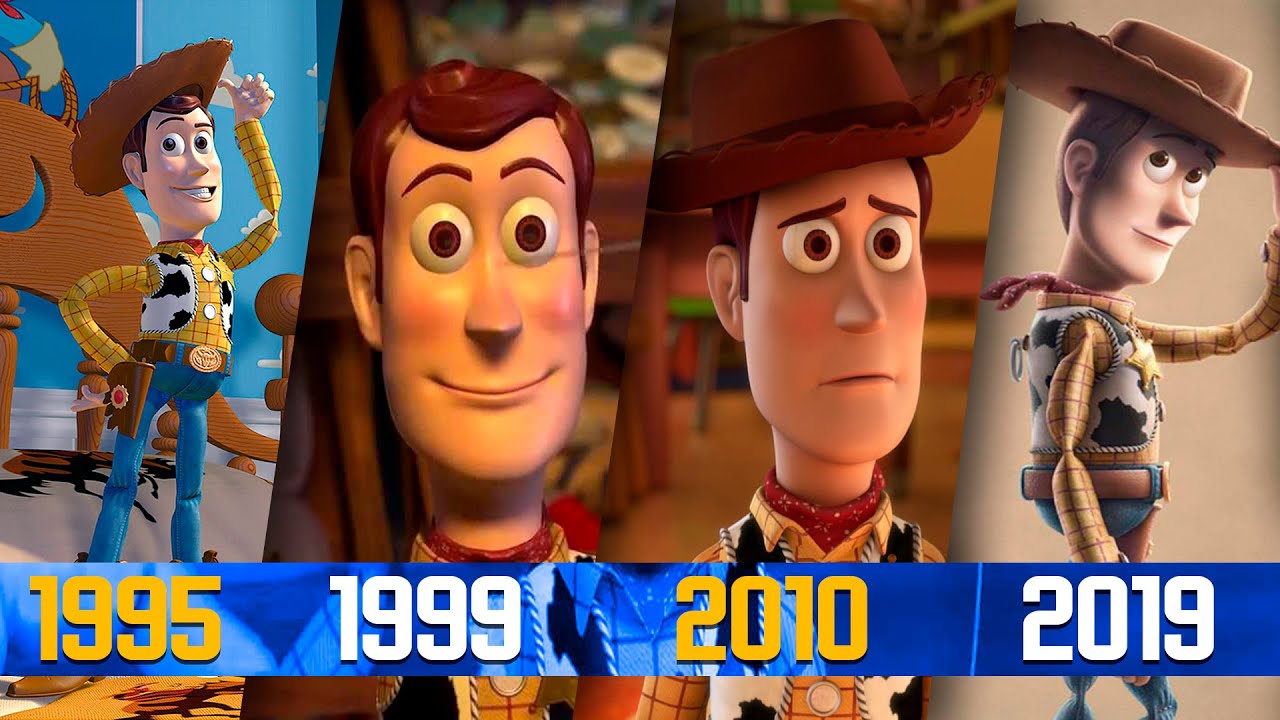
Cultural Impact & Critical Reception: The “Toy Story” series has left an indelible mark on popular culture and the animation industry, praised for its groundbreaking animation, storytelling, and character development. The films have enjoyed immense critical and commercial success, with Hanks’ portrayal of Woody being a central element of their appeal.
Comparisons & Legacy: In the context of Hanks’ career, the “Toy Story” series showcases his ability to connect with audiences beyond the screen, proving that his talent is not confined to live-action performances. The enduring popularity of Woody and the series underscores Hanks’ role in creating a legacy that transcends generations.

Transitioning from the animated world of “Toy Story” to the mysterious and thrilling landscapes of “The Da Vinci Code,” we see another facet of Hanks’ ability to captivate audiences.
6. The Da Vinci Code (2006)
Plot Overview: Directed by Ron Howard, “The Da Vinci Code” is a mystery thriller based on Dan Brown’s novel of the same name. Tom Hanks plays Robert Langdon, a symbologist who becomes embroiled in a historical mystery that involves a secret society, the Catholic Church, and the possibility of uncovering one of the greatest secrets of all time.
Character Development & Performance: Hanks embodies Langdon with a mix of intellect, skepticism, and resolve, navigating the film’s complex plot with a steady presence that anchors the narrative. His performance balances the film’s intellectual pursuits with the high stakes of its thriller aspects.
Thematic Elements: The film delves into themes of faith, history, and the power of secrets. It challenges viewers to consider the intersection of religion and history, and the nature of truth and belief.
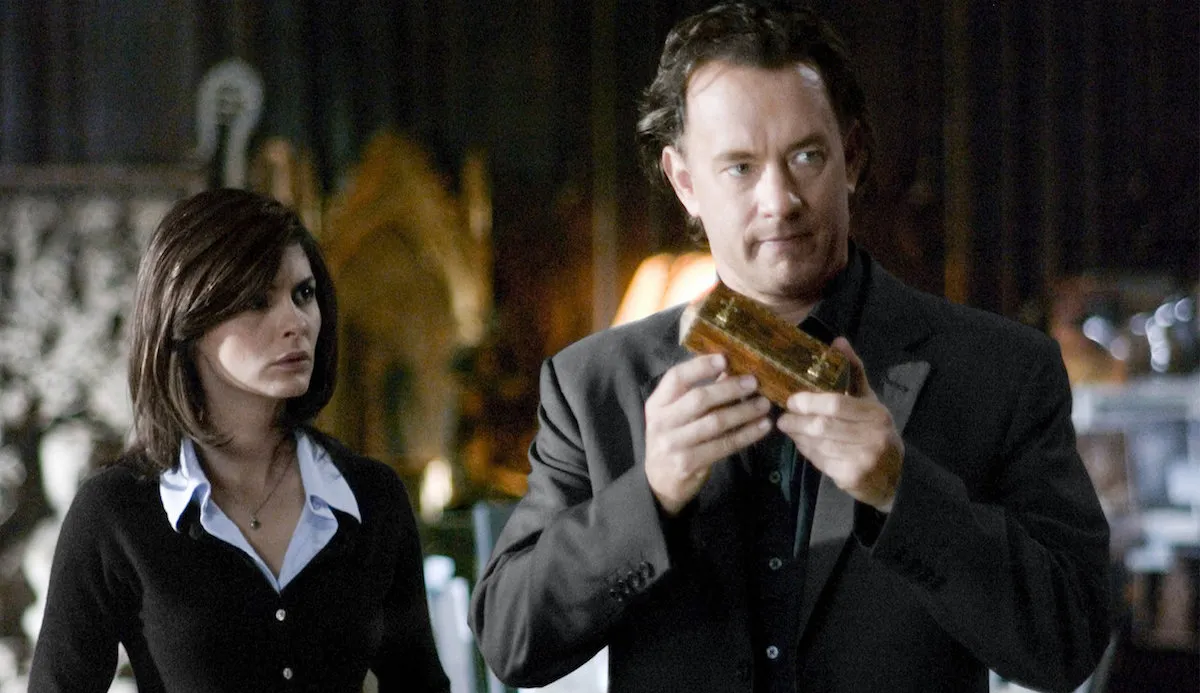
Cultural Impact & Critical Reception: While “The Da Vinci Code” garnered mixed reviews from critics, it was a box office hit and sparked widespread discussion and debate about its portrayal of religious and historical themes. Hanks’ role as Robert Langdon further exemplified his ability to lead films that engage with complex ideas and entertain on a global scale.
Comparisons & Legacy: “The Da Vinci Code” and its sequels allowed Hanks to explore a character deeply entrenched in intellectual curiosity and adventure, differing from the more emotionally driven roles he’s known for. The film’s success reinforced Hanks’ standing as a versatile actor capable of drawing audiences into intricate narratives.
The contrast between the family-friendly “Toy Story” series and the adult-themed “The Da Vinci Code” highlights Tom Hanks’ diverse range of roles and his unique ability to adapt to different genres and audiences. From bringing to life an animated cowboy doll to portraying a symbologist embroiled in a historical mystery, Hanks demonstrates his exceptional range and talent.

As we delve further into the top 10 movies of Tom Hanks, we explore a film that not only presented Hanks in a role based on real-life events but also showcased his ability to portray complex emotional narratives, followed by a dive into a character study that speaks volumes about modern society and communication.
7. Captain Phillips (2013)
Plot Overview: Directed by Paul Greengrass, “Captain Phillips” is a biographical thriller based on the 2009 hijacking of the US-flagged MV Maersk Alabama by Somali pirates. Tom Hanks plays the titular role of Captain Richard Phillips, depicting the harrowing ordeal that Phillips endured while being held hostage.
Character Development & Performance: Hanks delivers a gripping performance, capturing the tension, fear, and resilience of Captain Phillips during the hijacking. His portrayal is nuanced, showing both the vulnerability and steadfast courage of Phillips in the face of danger. The role further emphasizes Hanks’ ability to delve into the psyche of real-life figures, bringing authenticity and depth to the character.
Thematic Elements: The film explores themes of survival, leadership, and the complexities of global maritime trade and piracy. It also delves into the human aspect of the piracy issue, providing a glimpse into the desperation that drives such acts.
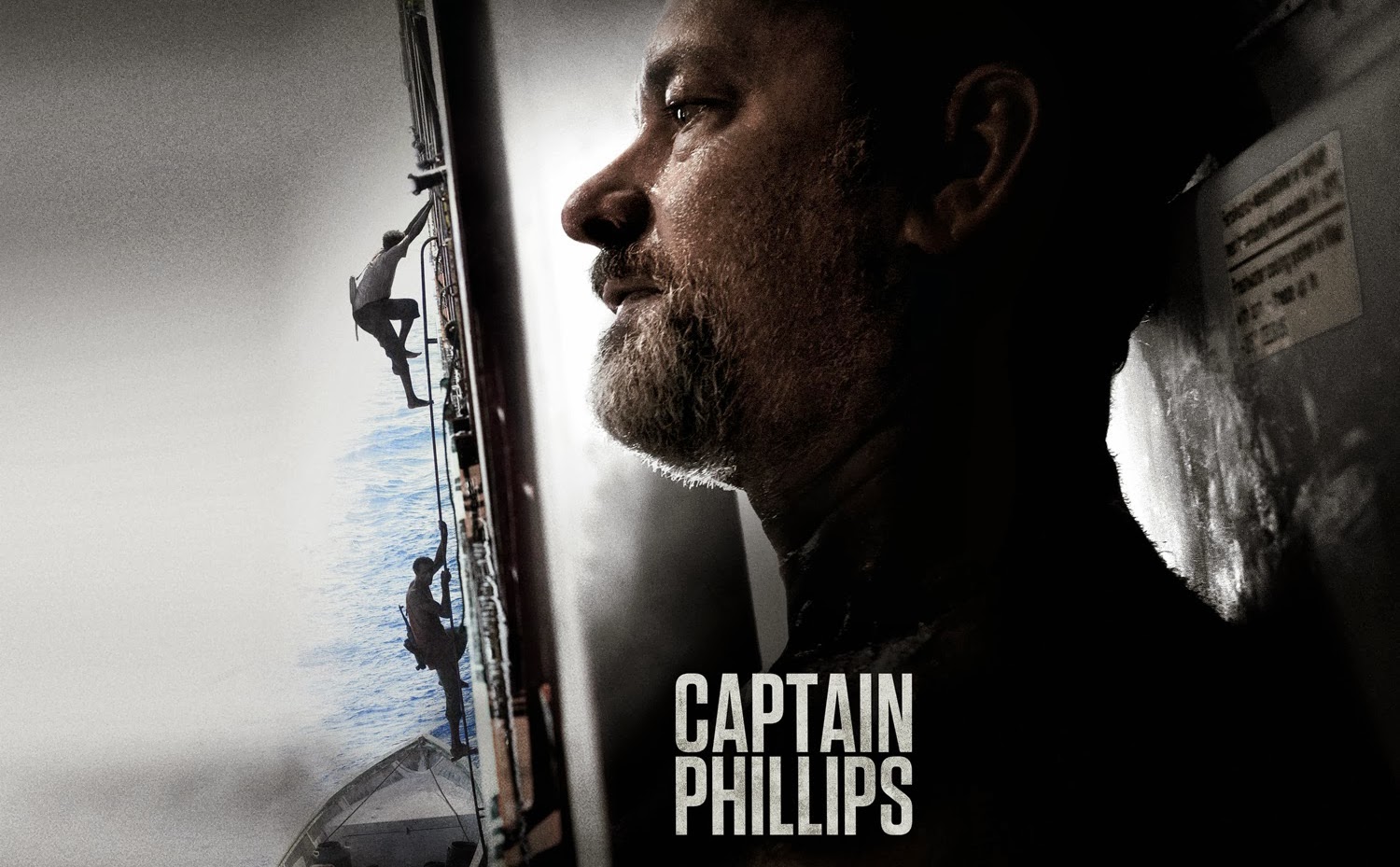
Cultural Impact & Critical Reception: “Captain Phillips” received widespread critical acclaim, particularly for Hanks’ performance and the film’s intense, realistic portrayal of the hijacking. The film sparked conversations about the risks faced by merchant mariners and the global issue of piracy.
Comparisons & Legacy: This role stands out in Hanks’ filmography as a testament to his ability to portray real-life figures in crisis, drawing audiences into the narrative with a compelling, empathetic performance. The film adds to his legacy as an actor capable of handling roles that demand a high emotional and physical toll.

Shifting from the high seas to the complexities of modern technology and its impact on human connections, we next explore “The Circle.”
8. The Circle (2017)
Plot Overview: Directed by James Ponsoldt, “The Circle” is a tech thriller based on the novel by Dave Eggers. Tom Hanks plays Eamon Bailey, the charismatic co-founder of The Circle, a powerful tech company that pushes the boundaries of privacy in the name of innovation and transparency.
Character Development & Performance: In a departure from his heroic roles, Hanks portrays a tech visionary whose ideals are both seductive and morally ambiguous. His performance as Bailey offers a critique of Silicon Valley’s utopian promises, highlighting the darker side of technological advancement and its implications for privacy and autonomy.
Thematic Elements: The film tackles themes of surveillance, privacy, and the ethical limits of technology. It questions the balance between transparency and the right to privacy, prompting viewers to consider the impact of technology on personal freedoms.

Cultural Impact & Critical Reception: “The Circle” received mixed reviews, with critics praising Hanks’ performance but critiquing the film for not fully exploring its provocative themes. Despite this, it sparked discussions about data privacy, surveillance, and the role of tech companies in shaping societal norms.
Comparisons & Legacy: While “The Circle” may not stand as a highlight in Hanks’ career in terms of critical success, it showcases his willingness to explore complex, contemporary issues through film. The role underscores his versatility and commitment to projects that stimulate dialogue on important social topics.
Through “Captain Phillips” and “The Circle,” we see the breadth of Tom Hanks’ talent and his ability to navigate both the emotional depth of true-life dramas and the ethical quandaries presented by modern technology. These films further cement his status as an actor whose roles not only entertain but also provoke thought and discussion on a range of significant issues.

Continuing our comprehensive exploration of Tom Hanks’ top movies, we next delve into a film that underscores his prowess in embodying characters who navigate through historical events, offering audiences a blend of education and entertainment. Following this, we’ll examine a performance that stands out for its emotional depth in a narrative that’s both intimate and universal.
9. Bridge of Spies (2015)
Plot Overview: Directed by Steven Spielberg, “Bridge of Spies” is a historical drama that tells the story of James B. Donovan, an insurance lawyer who finds himself thrust into the center of the Cold War when the CIA sends him on the nearly impossible mission to negotiate the release of a captured American U-2 pilot. Tom Hanks plays Donovan, embodying the character’s integrity, intelligence, and unwavering sense of duty.
Character Development & Performance: Hanks delivers a masterful performance, portraying Donovan as a man of principle, faced with the daunting task of navigating the treacherous waters of international diplomacy. His portrayal is a testament to the actor’s ability to convey deep moral conviction and the nuances of diplomacy with subtlety and strength.
Thematic Elements: “Bridge of Spies” explores themes of justice, duty, and the complexity of human nature against the backdrop of geopolitical tensions. The film delves into the ethical dilemmas of espionage and negotiation, highlighting the importance of integrity and human dignity in times of crisis.
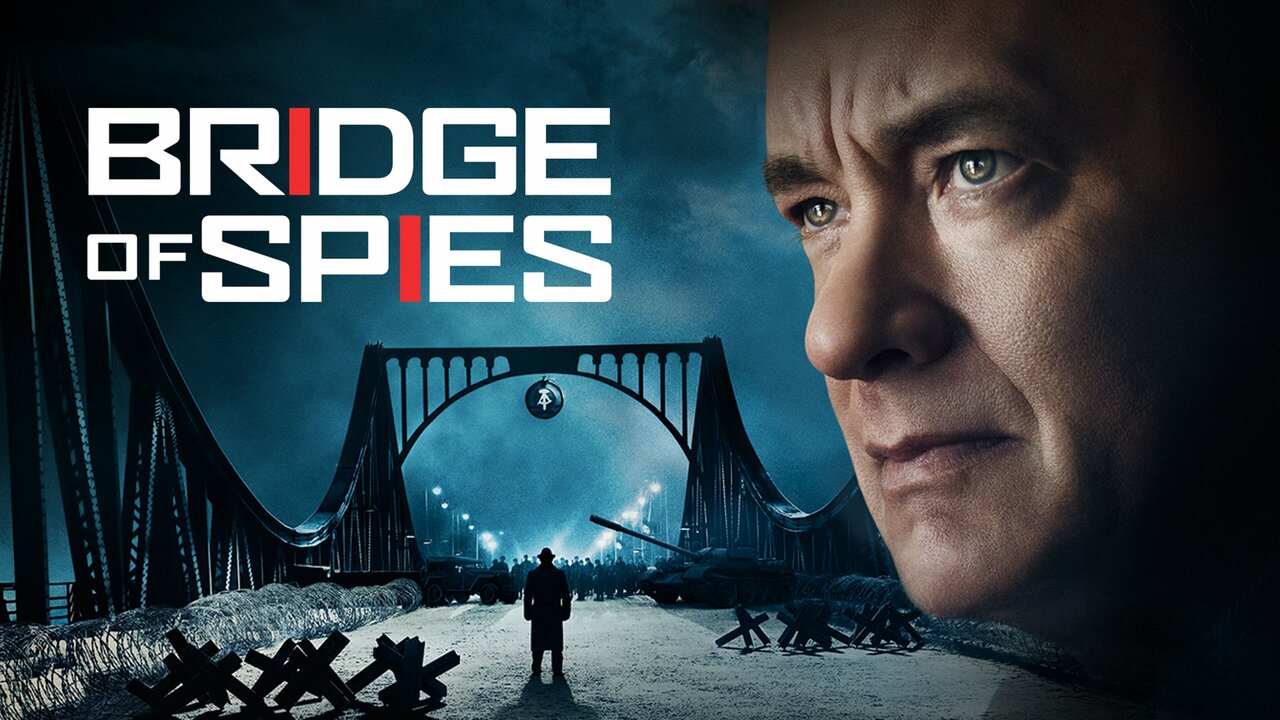
Cultural Impact & Critical Reception: The film was met with critical acclaim for its direction, screenplay, and Hanks’ performance. It serves as a reminder of the tense relations between the United States and the Soviet Union during the Cold War, while also celebrating the unsung heroes who worked behind the scenes to preserve peace.
Comparisons & Legacy: In Hanks’ filmography, “Bridge of Spies” stands as a powerful portrayal of a real-life figure whose actions had a profound impact on the course of history. It showcases Hanks’ skill in bringing depth and humanity to historical figures, further cementing his reputation as one of the most respected actors of his generation.

Transitioning from the high-stakes world of international diplomacy to the intimate confines of a newsroom, we explore Hanks’ role in “The Post.”
10. The Post (2017)
Plot Overview: Directed by Steven Spielberg, “The Post” chronicles the true story of The Washington Post’s decision to publish the Pentagon Papers, classified documents detailing the United States government’s involvement in the Vietnam War. Tom Hanks plays Ben Bradlee, the Post’s executive editor, who alongside publisher Katharine Graham (played by Meryl Streep), battles the government in a fight for press freedom and the First Amendment.
Character Development & Performance: Hanks captures the gritty determination and journalistic integrity of Ben Bradlee, delivering a performance that is both forceful and nuanced. His portrayal underscores the importance of the free press and the role of journalists in holding power to account.
Thematic Elements: The film tackles themes of press freedom, government accountability, and the role of women in leadership. It highlights the critical importance of courageous journalism and the ethical responsibilities of the media in a democratic society.
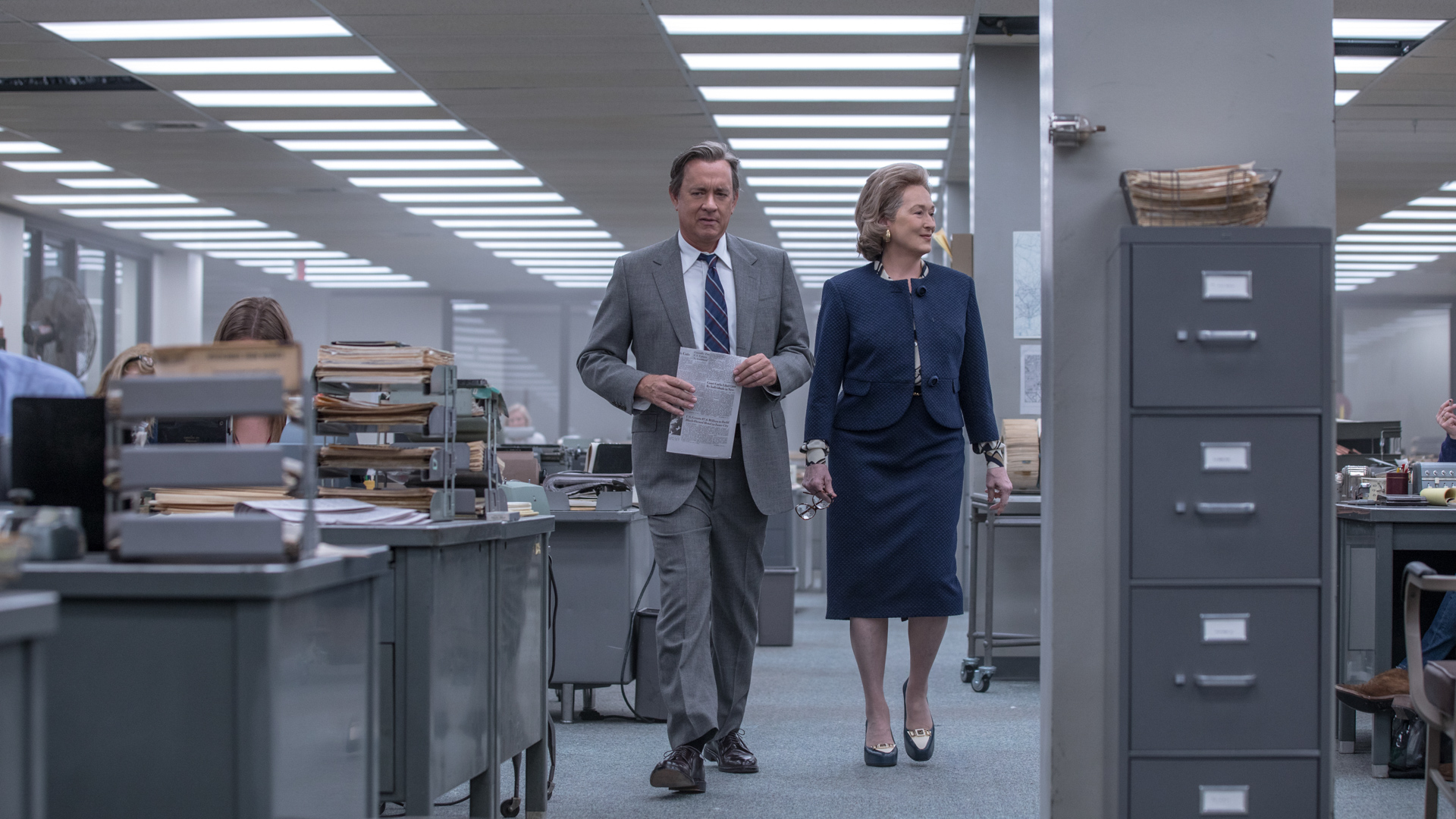
Cultural Impact & Critical Reception: “The Post” was acclaimed for its timely message about the importance of the free press, earning several award nominations. Hanks’ and Streep’s performances were particularly lauded, with the film drawing parallels to contemporary issues regarding media and government relations.
Comparisons & Legacy: “The Post” adds another layer to Hanks’ portrayal of historical figures, demonstrating his ability to convey the complex challenges and ethical dilemmas faced by those in positions of leadership. The film, much like “Bridge of Spies,” underscores Hanks’ talent for narratives that combine historical depth with contemporary relevance.
Through “Bridge of Spies” and “The Post,” Tom Hanks continues to illustrate his unparalleled ability to engage with historical narratives, bringing to life characters who navigate complex moral landscapes. These performances not only entertain but also educate, shedding light on pivotal moments in history and the individuals who shaped them.

As we near the conclusion of our exploration into the top 10 movies of Tom Hanks, it’s essential to highlight a film that not only demonstrates Hanks’ ability to anchor a movie with a singular, compelling performance but also his knack for selecting roles that resonate on a deeply human level, touching on themes of hope, redemption, and the transformative power of kindness.
Bonus
11. Sully (2016)
Plot Overview: Directed by Clint Eastwood, “Sully” is a biographical drama that chronicles the events of the January 15, 2009, emergency landing of US Airways Flight 1549 on the Hudson River, piloted by Captain Chesley “Sully” Sullenberger, played by Tom Hanks. The film focuses on the aftermath of the landing, as Sully faces an investigation that threatens to destroy his career and reputation.
Character Development & Performance: Hanks delivers a stoic and nuanced performance as Sully, capturing the pilot’s professionalism, humility, and inner turmoil as he navigates the investigation. His portrayal reflects the emotional and psychological depth of a hero who insists he was just doing his job, offering audiences a glimpse into the personal cost of public heroism.
Thematic Elements: “Sully” explores themes of heroism, duty, and the struggle for validation in the face of bureaucratic skepticism. It raises questions about the nature of heroism and the value of human life, emphasizing the importance of experience, intuition, and the human factor in critical decision-making.
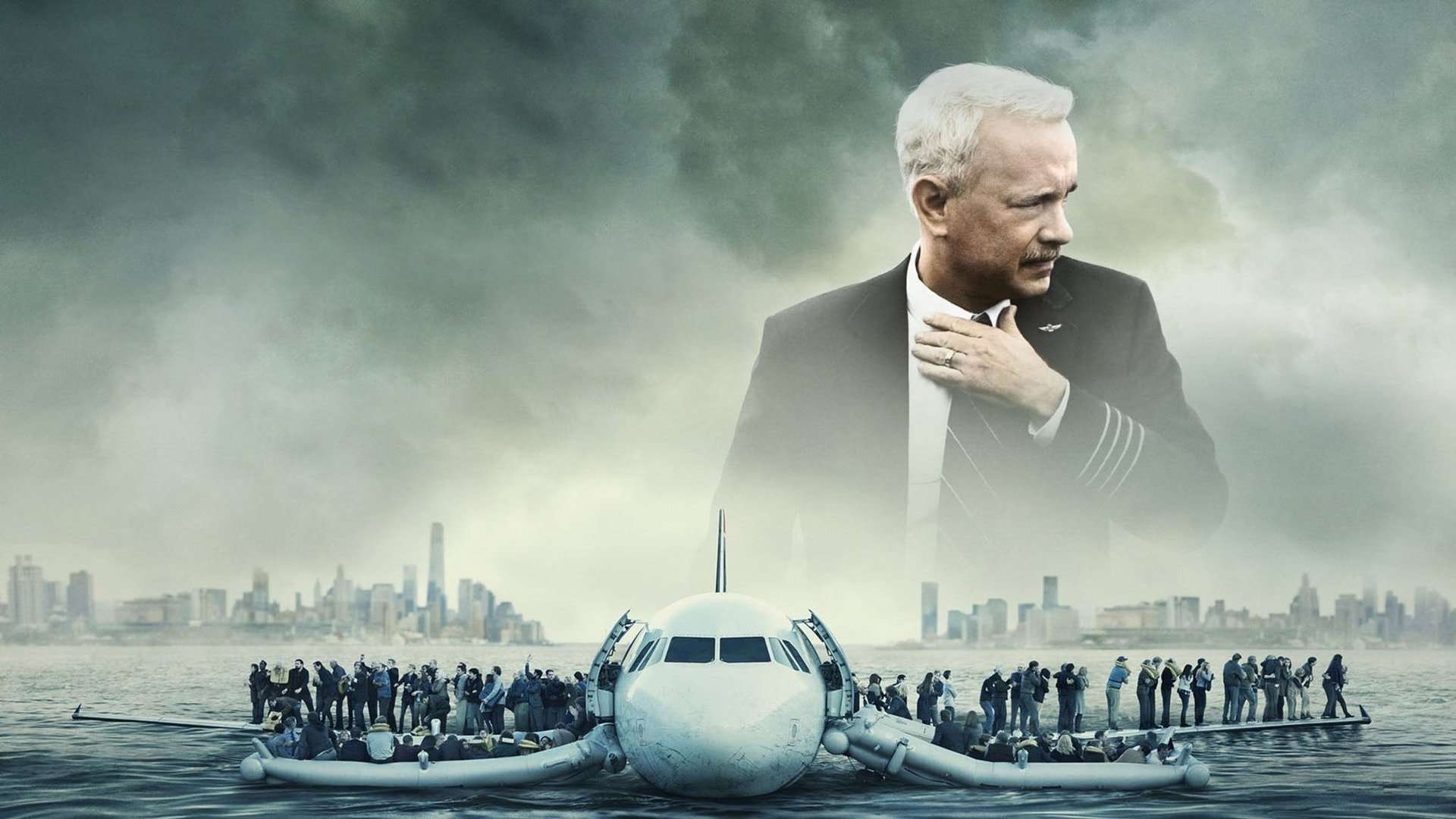
Cultural Impact & Critical Reception: The film was praised for its direction, screenplay, and especially Hanks’ performance, adding another heroic real-life figure to his filmography. “Sully” was a commercial success and was lauded for its respectful and compelling portrayal of the “Miracle on the Hudson,” reinforcing the importance of individual acts of bravery.
Comparisons & Legacy: “Sully” stands as a testament to Hanks’ ability to convey the complexities of real-life heroes, showcasing his knack for embodying characters that are both extraordinary and relatable. The film’s focus on the human element of a widely publicized event highlights Hanks’ enduring appeal as an actor capable of bringing depth and dignity to the individuals he portrays.

In the final analysis of our journey through Tom Hanks’ most impactful films, we turn our attention to a performance that encapsulates his career-long theme of exploring the human condition through a unique blend of empathy, humor, and resilience.
12. A Beautiful Day in the Neighborhood (2019)
Plot Overview: Directed by Marielle Heller, “A Beautiful Day in the Neighborhood” is a biographical drama inspired by the true story of Fred Rogers (played by Tom Hanks) and his friendship with journalist Tom Junod (renamed Lloyd Vogel in the film). The movie explores the transformative effect Rogers, the beloved host of the children’s television show “Mister Rogers’ Neighborhood,” has on Vogel’s cynical outlook on life.
Character Development & Performance: Hanks embodies Fred Rogers with a gentle, measured performance that captures the essence of Rogers’ kindness, patience, and wisdom. His portrayal is a tender reminder of the power of empathy and understanding, earning him widespread acclaim and an Academy Award nomination for Best Supporting Actor.
Thematic Elements: The film delves into themes of forgiveness, emotional healing, and the impact one person can have on the lives of others. It emphasizes the importance of listening, kindness, and the courage to confront and express one’s feelings.
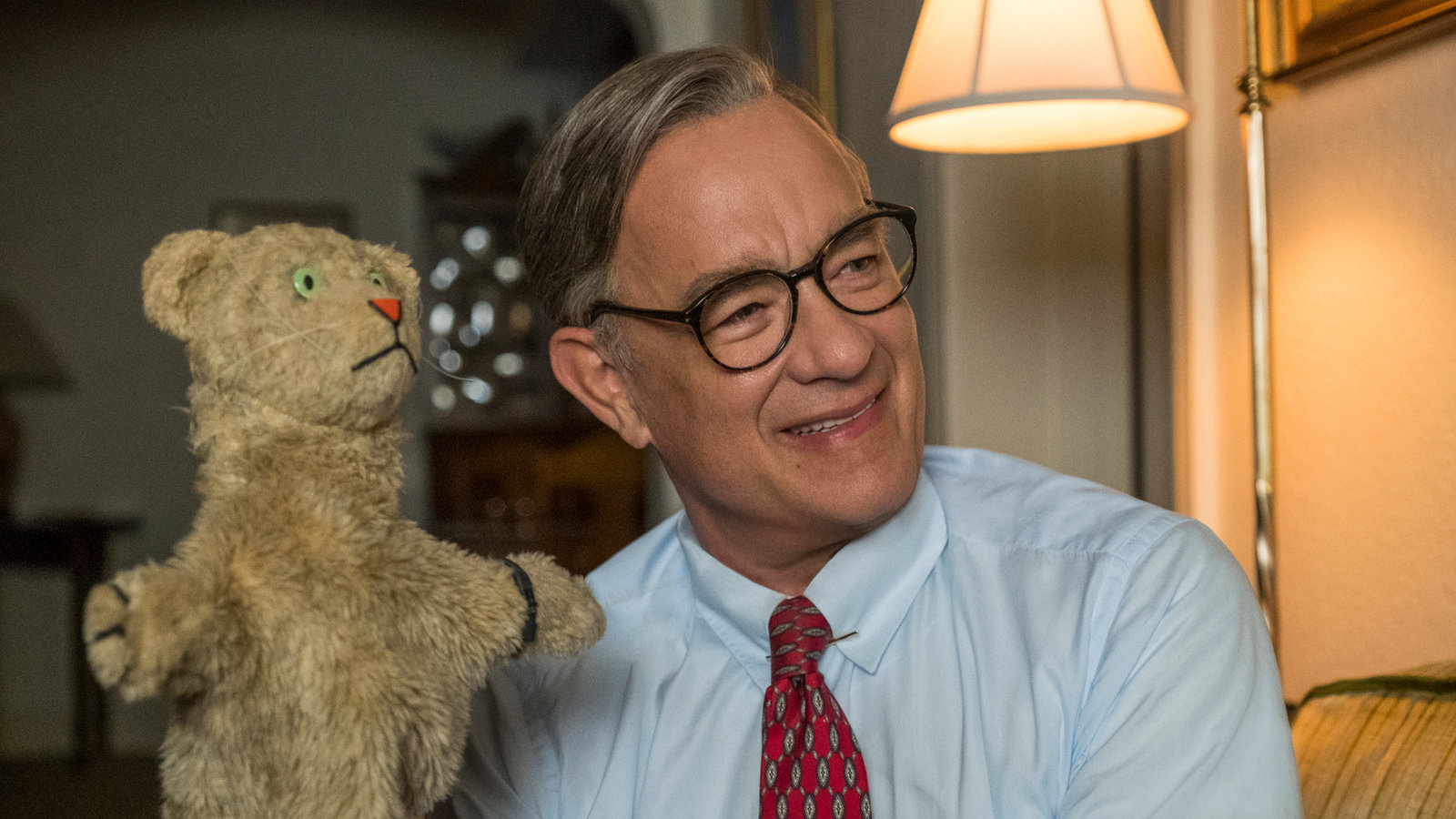
Cultural Impact & Critical Reception: “A Beautiful Day in the Neighborhood” was embraced by audiences and critics alike for its heartwarming narrative and Hanks’ portrayal of Fred Rogers. The film served as a timely reminder of the values Rogers espoused, offering a message of hope and kindness in a divisive world.
Comparisons & Legacy: This role further solidifies Hanks’ status as an actor capable of profound emotional resonance, adding a layer of compassionate depth to his diverse body of work. By portraying Fred Rogers, Hanks reminds us of the enduring power of kindness and the impact of television as a medium for good.
Through films like “Sully” and “A Beautiful Day in the Neighborhood,” Tom Hanks has not only entertained millions but also inspired them, proving cinema’s power to illuminate the best of the human spirit. His career is a testament to the art of storytelling, demonstrating that at the heart of every great film is the ability to connect with the audience on a personal and emotional level.

As we conclude our exploration of Tom Hanks’ top 10 movies, it’s clear that his legacy in Hollywood is defined by his versatility, depth, and the indelible mark he has left on both the industry and its audiences. Hanks has become synonymous with characters that embody the complexity, resilience, and goodness of the human condition, making him one of the most beloved and respected actors of his generation.
Having traversed through the landscape of Tom Hanks’ most influential and memorable roles, it’s clear that his contributions to cinema extend far beyond the confines of individual performances. Hanks has not only left an indelible mark on the art of acting but has also influenced the film industry in significant ways, championing stories that resonate with depth, humanity, and a profound understanding of the human experience. As we reflect on his legacy and the thematic tapestry woven through his top films, it becomes apparent that Hanks’ career offers a rich canvas for exploring the nuances of storytelling, character development, and the transformative power of cinema.
Reflection on Tom Hanks’ Legacy in Hollywood
Tom Hanks’ career is a testament to the power of nuanced storytelling and the importance of empathy in art. From his early roles in comedies to his transformative performances in dramas and biopics, Hanks has demonstrated a remarkable range and depth. His ability to imbue each character with authenticity and emotional complexity has made him a cornerstone of contemporary cinema. Through his work, Hanks has explored themes of heroism, resilience, human connection, and the complexities of the human spirit, offering audiences around the world a lens through which to understand themselves and others more deeply.
Hanks’ choice of roles reflects a keen interest in stories that matter—stories that challenge, inspire, and celebrate the human condition. Whether portraying a stranded survivor, a courageous soldier, a dedicated captain, or a beloved children’s television host, Hanks brings a level of dignity and integrity to his characters that is both rare and compelling. His performances have not only entertained but also educated, shedding light on historical events, cultural issues, and the inner workings of the human heart.
Beyond his on-screen achievements, Tom Hanks has contributed to Hollywood through his work as a producer and director, further impacting the film industry by supporting projects that align with his vision of storytelling with substance. His advocacy for stories that resonate on a personal and societal level has enriched the cinematic landscape, encouraging a dialogue between the film as an art form and its audience.
Tom Hanks’ Influence on Contemporary Cinema
Tom Hanks‘ influence on contemporary cinema can be seen in the roles he has chosen and the projects he has supported throughout his career. His commitment to storytelling excellence has set a high bar for actors and filmmakers alike, pushing the industry toward more meaningful and impactful narratives. Hanks has become a symbol of the potential for cinema to not only entertain but also enlighten, challenge, and comfort its audiences.
His legacy is one of hope, resilience, and the enduring power of kindness—themes that have become increasingly relevant in our contemporary world. Through his diverse body of work, Hanks has shown that cinema can be a force for good, a means of bridging divides, and a source of inspiration for those seeking to make sense of the world around them.
Conclusion
In examining the top 10 movies of Tom Hanks, we’ve seen how his career reflects an unwavering commitment to exploring the depth and breadth of the human experience. Hanks has not just portrayed characters; he has given life to stories that remind us of our shared humanity, our capacity for greatness, and the importance of empathy and understanding. As we look back on his contributions to Hollywood, it’s clear that Tom Hanks’ legacy is not only built on his exceptional talent as an actor but also on his profound impact on the art of storytelling and the hearts of audiences worldwide. Tom Hanks’ journey through cinema serves as a beacon for aspiring actors and filmmakers, illustrating that at the heart of successful storytelling lies the ability to connect, feel, and to evoke empathy. His career is a reminder of the power of film to illuminate, transform, and endure—a legacy that will continue to inspire generations to come.


